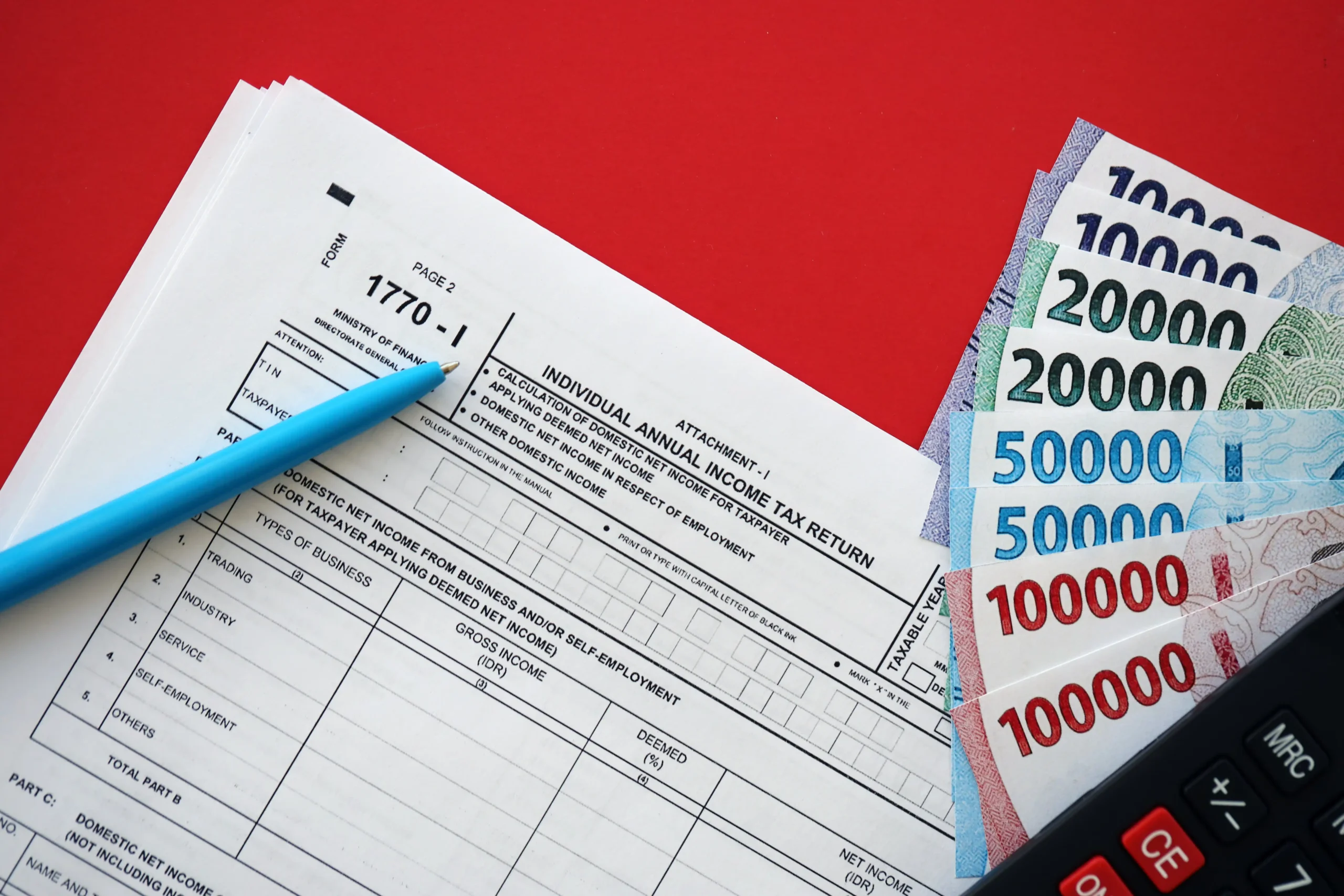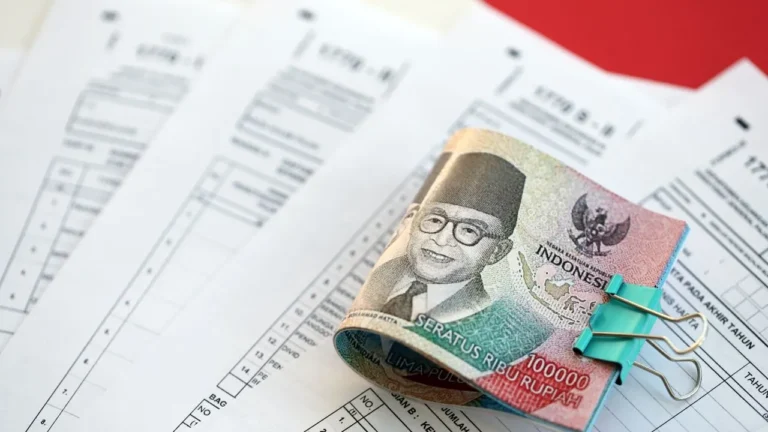Table of Contents
ToggleThe tax rate in Indonesia can be confusing for a non initiate person or company. This articles review the different types and principles of tax in Indonesia for expats and companies in Indonesia or Bali.
Definition of taxpayer in Indonesia
In Indonesia, a taxpayer is defined as an individual or entity that is obligated to pay taxes in the country despite being a resident or non-resident. This obligation is due to whether you are earning income, conducting business, or holding assets within Indonesia. Here are the different categories of taxpayers:
- Individual Taxpayers: Both residents and non-residents who earn income in Indonesia are considered taxpayers
- Corporate Taxpayers: Legal entities established or domiciled in Indonesia or that derive income from activities conducted in Indonesia.
- Non-Resident Taxpayers: Individuals or entities that do not reside or are not established in Indonesia. Those non-residents are subject to a withholding tax in most circumstances.
Never worry about taxes and accounting again
Dealing with finances, taxes, and accounting can feel overwhelming, especially as a foreigner in Indonesia. Let us guide you through processes like tax calculation, payroll, personal or corporate tax, short-term investments, balance sheet analysis and much more.
With ILA by your side, nothing can go wrong. Schedule a free consultation today or learn more about our tax and accounting services.
Principle of taxable income and final tax in Indonesia
Principle
For legal entities and individuals, it might be sometimes confusing to define how the income is taxable. Indeed Indonesia classifies the turnover into 2 different categories:
- Taxable income under the Corporate Income Tax and Personal Income Tax
- Taxable income under the final tax
By final tax Indonesia defines that an income taxed under the final tax is not subject to a taxation under the personal income tax for an individual and under the corporate income tax for a corporation.
Also read: Understanding VAT and Income Tax For Crypto Assets in Indonesia
Income under the final tax (Article 4 PPh Final)
- Interest from deposits, savings, and Bank Indonesia Certificates
- Interest from bonds
- Discount on State Treasury Bills (SPN)
- Lottery winnings
- Sale of shares and other securities
- Income of venture capital companies from the sale of shares or the transfer of equity in their portfolio companies
- Income from the transfer of ownership of land and/or buildings
- Income from the transfer of real estate under investment contracts
- Income from construction services
- Income from the rental of land and/or buildings
- Income of domestic shipping companies
- Income of foreign shipping and/or aviation companies
- Income of foreign taxpayers with trading representative offices in Indonesia
- Excess depreciation on fixed assets
Individual Income Tax (IIT) Rate in Indonesia

General rules
Individuals in Indonesia are subject to Individual Income Tax (IIT) or Personal Income Tax (PIT) with a progressive rate. This means the tax rate increases as income rises. The rates range from 5% to 35%, depending on the taxpayer’s income bracket.
Residents are taxed on their worldwide income, while non-residents are only taxed on income made in Indonesia.
- Up to IDR 60 million: 5%
- IDR 60 million – 250 million: 15%
- IDR 250 million – 500 million: 25%
- IDR 500 million – 5 billion: 30%
- Above IDR 5 billion: 35%
Exemption for foreigners
Foreigners are taxed on their worldwide income but can claim a tax exemption and require the principle of territoriality during their first 4 years of residence based on the tax attachment II of PMK No. 18/ PMK.03/2021) and if the f reigner has been in Indonesia for less than 4 years (Nomor 18/PMKc03/2021). After 4 years, the foreigner is taxed on its worldwide income.
Exemption for lower salaries
Indonesia provides a tax exemption and does not tax revenues up to 54 million if the revenue is issued from a salary.
Corporate Income Tax (CIT) Rate in Indonesia
General Rules
The Corporate Income Tax (CIT) rate in Indonesia is at a rate of 22%. However, certain exemption or tax facilities apply for small and medium businesses who are eligible and some revenue are subject to a final tax without being taxed under the CIT.
Indonesia provides a tax facility for businesses with a turnover below 50 billion IDR with a tax rate between 11 and 13%.
Tax facilities and tax exemptions
Certain businesses can claim a tax rate at 0.5% on their turnover during the first 3 years of their establishment for the revenue doesn’t exceed 4.8 billion IDR (around 300,000 USD) per year. However not all businesses are eligible for this tax facility. We recommend consulting your tax consultant or ILA for more information.
Additionally, certain industries or regions, such as Sanur and Batam, may benefit from specific tax incentives, including lower rates or tax holidays.
Branch Profit Tax (BPT)
The profit of branch offices operating in Indonesia for a foreign company is subject to a tax rate of 20%. The tax rate can be lower under certain circumstances. We recommend consulting the tax treaty to identify the applicable tax rate.
Dividend Tax Rate in Indonesia
The applicable tax rate for residents is at 10% while it is at 20% for non-residents. However certain tax treaties with Dubai, Singapore, Hong Kong allow to get a lower tax.
Value-Added Tax (VAT) Rate
The VAT in Indonesia is at 11% in 2024 and could increase to 12% in 2025. Legal entities have to invoice the VAT if their revenue exceeds 4.8 billion per year or if they conduct activities with a scope that requires the VAT. The VAT can be offset every month based on the balance between the VAT collected and the VAT paid.
Withholding Tax (WHT) Rate
The withholding tax system is probably the most difficult system to understand for new taxpayers in Indonesia. The withholding tax system forces the taxpayer to withhold a tax on behalf of the person subject to the tax.
Individuals with Legal Entity
If the seller of a good or service is dealing with a legal entity (type PT PMA or PT PMDN), the company is in charge of withholding the tax and paying on behalf of the individual resident or non-resident.
For example, a company needs to withhold the tax before sending money to a non-resident receiving income outside Indonesia. The taxpayer needs to apply the VAT. If the seller is a legal entity selling to an Individual the withholding tax doesn’t apply.
Individual with Individual
In the event both parties are individuals, the withholding tax system doesn’t apply and the seller is in charge of collecting the tax.
Legal entity with legal entity
In the event that both parties are a corporation, the company purchasing the service or the goods is in charge of withholding the tax and paying the tax on behalf of the seller. The buyer has to provide a receipt to the seller and will use it to reduce its corporate income tax.
Type of withholding in Indonesia
Indonesia applies such different withholding tax rates that we strongly recommend consulting your tax advisor or ILA to avoid double taxation at the end of the year.
- Income tax (PPh 21) – see above
- Service (PPh 23): 2%
- Sales of goods: 0.5%
- Lease tax: 10%
- Dividend tax (Article 23): 10 to 20%
- Contractor tax (PPh 4) 1.75% to 6%
- Non-resident (PPh 26) 20% + VAT
- Import tax rate: Import tax + VAT























